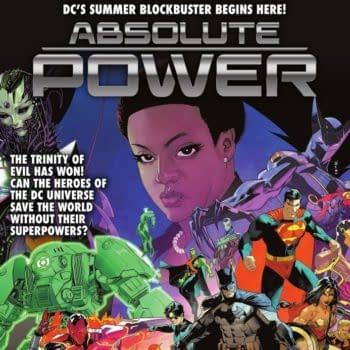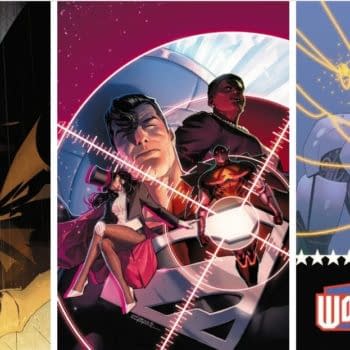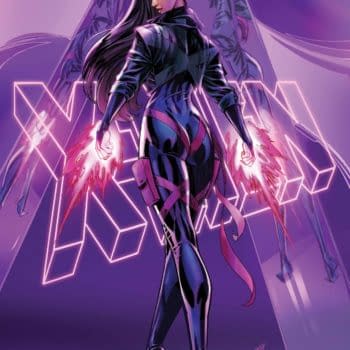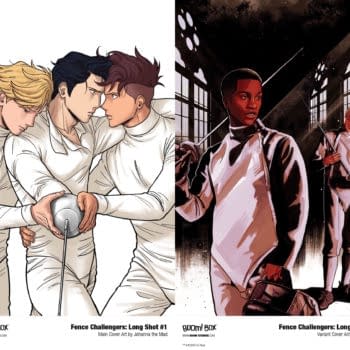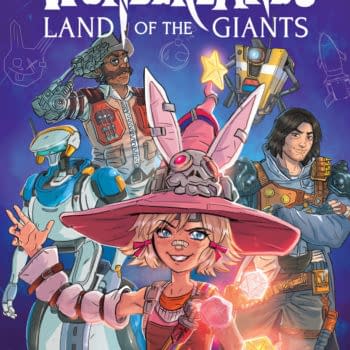Posted in: Comics | Tagged: #muslimban, adam hughes, armor, Banshee, bishop, black panther, black widow, chamber, colossus, Cory Smith, dc, donald trump, greg pak, hercules, immigrant, immigrants welcome here, immigration, jubilee, Kevin Wada, kris anka, kwannon, m, maggott, marvel, ms marvel, nicola scott, nightcrawler, nova, phil noto, pixie, Psylocke, quicksilver, rage, scarlet witch, shang chi, Silk, steve bannon, storm, sunfire, superheroes, superman, theresa may, totally awesome hulk, wolverine, wonder woman, xorn
Comic Books – Immigrants Are Welcome Here

Writer Greg Pak has raised an excellent point on twitter in response to the #MuslimBan, the controversial Executive Order from President Donald Trump that bans immigration from seven countries of largely Muslim population. The ban is affecting refugees from war-torn regions, ideological or social refugees who would face recriminations and death in some cases for the simple nature of their being alive, and also those with existing green cards for the US, dual citizenship and business reasons for their travel. Already, we have seen Oscar- nominated creators prevented from attending the Academy Awards, doctors unable to travel to the States, Iranian scientists refused entry to work on cures for diabetes, UK citizens forced to make expensive alternative arrangements to get home so as to avoid landing in the US, and even a five year old detained for hours, separated from his mother.
All this within hours of the Executive Order coming into effect, and being but a few examples.
There have been protests, and widespread condemnation of Trump's move, which many speculate was actually suggested by adviser Steve Bannon, a man who has considered the power of Satan and Darth Vader with reverence, from the citizens of the United States, from the comics community, from the international community, and indeed from country leaders (though notably not my own, at least not until Theresa May was once again safely ensconced at No. 10 Downing Street, and then only the lightest of comments on the matter).
Anyway, as I said, Greg Pak raised an interesting point on the matter.
And it's entirely correct. So many comic characters are immigrants, or the children of immigrants. In many cases, it's a formative part of the character themselves and what makes them tick, more than just an element of creative colour to add definition or difference to them.

Take Superman. Superman is an immigrant, admittedly from another planet, but one all the same. He's also, technically, an undocumented immigrant. But he grows up to represent the quintessential American ideal. Superman is an example of how immigration can work and also how compassion and acceptance of someone 'not from around here' can become a vital and important part of our culture. And indeed in Superman's titles, of American culture. After all, for so long he has fought for Truth, Justice and the American Way.

But it doesn't end at one of the earliest superheroes. Oh no, let's take a look at the X-Men. The majority of the X-Men are immigrants, documented or otherwise, and/or children of immigrants. Wolverine is an immigrant from Canada. Storm holds dual citizenship with America and Kenya.

Consider this image alone: we have British, Japanese, various African countries, Russian, Irish, German, Canadian and Australian, all in this one image. Not to mention the X-Men have included Welsh, Brazilian, Scottish, Indian, and the list goes on.

Wonder Woman is an immigrant, from a next to unknown nation, and one that has even been known to be presented as hostile. Yet, she is also often welcomed as an American symbol.

So many of the biggest superheroes would be immigrants, and currently, unwelcome in America. I've already pointed out two of DC's Trinity, a vast section of X-Men, but also, the Avengers are not without their immigrants.

Scarlet Witch, Quicksilver, Nova, Black Widow, Rage, Black Panther, Hercules – heroes often from global backgrounds coming together to fight for what is right, and accepted in most cases by the US, even welcomed and homed there.

Indeed, one of the most recent huge success stories of comics is the child of immigrants and also a Muslim. Ms. Marvel has become iconic, with artwork of the character being used at the Woman's March and in protests against Trump and anti-Muslim propaganda. Ms. Marvel has become the symbol of a naturalised American citizen whose love for her country and others is boundless.

In comics, we've often been taught to not even consider nationalities. Instead, what is important to us as an audience, and in deciding what characters are good or bad isn't where they come from, but what values they hold. In what ways are they like us. Do their hopes, dreams and desires match our own. And more importantly, perhaps, in the actions they take.

Superheroes, then, are beyond nationalities. They are symbols of how we can come together, and welcome each other with open arms and work towards the same goals.
In comic books, at least, immigrants are indeed welcome here.











